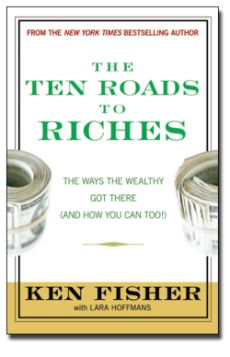 I recently finished reading the 10 Roads to Riches by Kenneth Fisher and found it refreshing in the field of personal finance books that often repeat the same mantra. Kenneth’s book takes a realistic approach and gives options on how the most effectively build wealth through ten different strategies.
I recently finished reading the 10 Roads to Riches by Kenneth Fisher and found it refreshing in the field of personal finance books that often repeat the same mantra. Kenneth’s book takes a realistic approach and gives options on how the most effectively build wealth through ten different strategies.
Insightful, accurate, and educating are a few of the words I’d use to describe the book. You can definitely tell the author has experience in many of the realms of which he speaks throughout the book. There isn’t a lot of fluff, and hardly any personal finance 101 talk in this book. If you’re serious about becoming wealthy and want to know your options to getting there, I’d consider taking a read through the 10 roads to riches.
Each chapter of the book goes into detail on a particular way to become wealthy and I’ve briefly summarized each below, which are in no particular order.
1. – Be a sidekick – Work underneath someone who’s powerful. Charlie Munger and Warren Buffett is a good example. Sidekicks typically don’t like the spotlight but work with other successful folks typically in a business. This could mean being a partner in a successful business, the CFO, or other higher up in a company.
2. Athlete or Entertainer – Although some think natural born talent is required to become an athlete or entertainer, some would disagree with you. Consider Michael Jordan, who wasn’t good enough at a young age but worked his tail off to become one of the most popular basketball legends of our time.
3. CEO – This is focused more on the traditional route. Get good grades, work hard, go to business school, play by all the rules, and work your way up the corporate ladder. If you want it bad enough and are willing to put in the time, you can become CEO.
4. Invest in Real Estate – Kenneth stresses using leverage to buy property and increase the rate of return on property. If you buy property outright via cash your rate of return will diminish, but using leverage and other people’s money your return will increase quickly into the double digits. He recommends finding a small property to start then leveraging into larger properties, much like going up a staircase.
5. Enter the legal field – Although recently there has been an oversupply of lawyers, the field is still fairly lucrative depending on what type of law you practice.
6. Start a business – Although the majority of businesses fail, the risk associated with business is offset by the rewards gained if a business becomes successful.
7. Invent Something – Easier said than done, but any new product, patent, or license could yield a hefty profit if useful to enough people.
8. Save and Invest Wisely – Following the simple principles of spending less than you make, using the time value of money, and finding ways to increase your income, anyone can become wealthy over time with persistence and a plan, even on an average income.
9. Manage Other People’s Money (OPM) – The author asserts that this is one of the easiest ways to wealth since the field of finance has so many opportunities. Working in banking, equities, insurance, or financial planning would allow you to make money using other people’s money.
10. Marry Rich – If you marry for money, it’s pretty sad, but it’s effective. One of the quickest ways to become wealthy is simply to marry into wealth.
Of course there isn’t “win the lottery or find a suitcase full of money on the list because they’re so luck intensive. I think this is a great starting point to at least understand options for becoming wealthy.
Within each chapter Mr. Fisher goes into detail about each topic and the strategies involved in building wealth with these topics.
Saving and Investing wisely is the most popular choice since anyone can do it, but it also typically takes the longest out of the other categories. However, it’s much more predictable and has been proven over and over. That’s why most personal finance blogs and books focus on these basics, since they’re applicable to almost anyone.
Of course you could mesh several of these strategies together, by say starting a business then investing the proceeds in real estate, or using the proceeds to save and invest. However, all are ways to generate wealth effectively.
For more information on the book check out the website here
To pick up a copy you can buy it here.
Do you think the author has missed any other ways to become realistically wealthy?








